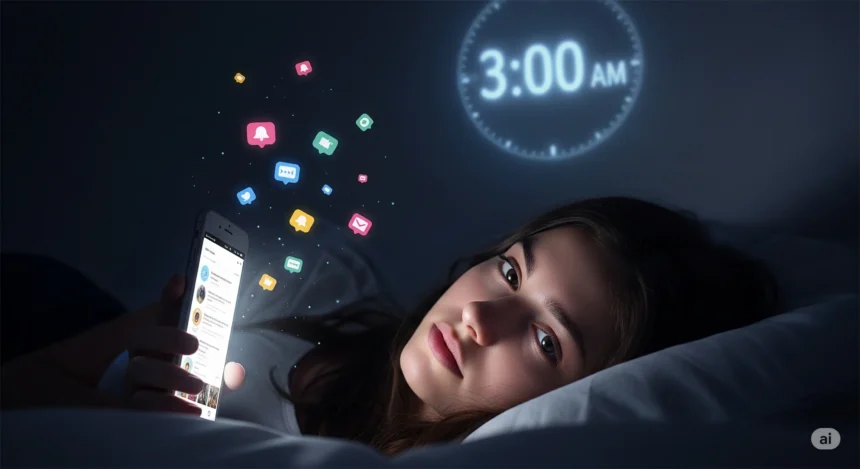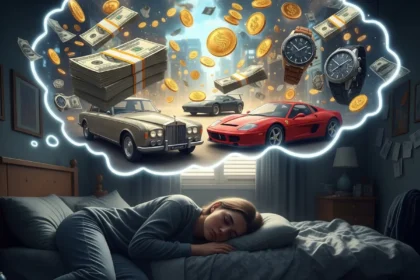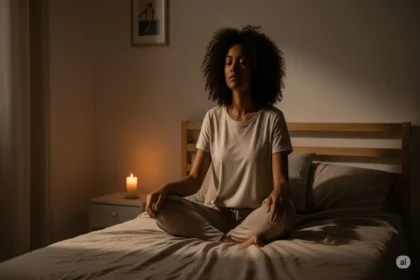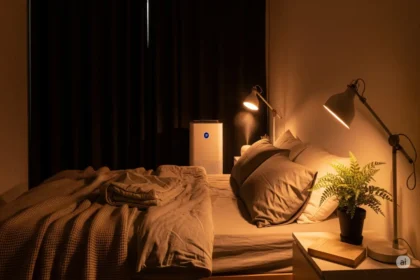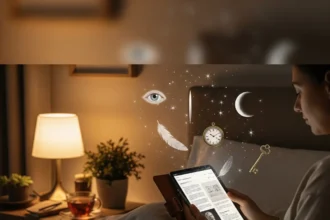The glowing rectangle has become our constant companion, a portal to connection, information, and endless entertainment. We clutch our smartphones in the morning, scroll through them on commutes, and, for far too many of us, tuck them under our pillows at night. By now, the insidious impact of blue light on our sleep cycles is a well-worn narrative. We’ve heard the warnings: the short-wavelength light emitted by screens suppresses melatonin, delays sleep onset, and wreaks havoc on our circadian rhythms. But what if the problem ran deeper than just light? What if the true hijackers of our precious sleep weren’t just the photons blasting into our retinas, but the very content and mechanisms of social media itself?
Beyond the widely discussed biological disruption of light, social media platforms are stealthily eroding our sleep quality through psychological and physiological pathways that are often overlooked. It’s a complex, multi-faceted assault on our ability to truly switch off, leaving us wired, anxious, and perpetually short on the restorative slumber we desperately need. As a curious journalist, I’ve delved into the evolving research and spoken with individuals caught in this nocturnal tug-of-war, uncovering a more nuanced, and perhaps more alarming, picture of how our digital habits are stealing our sleep.
The Dopamine Hook: The Reward System Run Wild
Imagine a tiny, eager squirrel in your brain, constantly seeking out nuts. That squirrel is your dopamine system, and social media is a virtually endless supply of delicious, unpredictable treats. Every notification, every “like,” every new follower, every piece of engaging content triggers a tiny hit of dopamine, a neurotransmitter associated with pleasure and reward.
- The Science: Dopamine plays a crucial role in wakefulness and arousal. When our brains are bathed in dopamine, particularly close to bedtime, it sends a powerful “stay awake and seek more rewards” signal. This is the opposite of what our bodies need to prepare for sleep, which involves a natural decline in arousal. The intermittent reinforcement schedule that social media platforms are expertly designed around – the unpredictable nature of when the next “hit” will arrive – makes them incredibly addictive, keeping us glued to our screens in a perpetual state of anticipation. This constant low-level excitement acts as a significant barrier to the mental quietude required for sleep onset. Research published in Addiction Biology and Psychology of Addictive Behaviors highlights the neurobiological underpinnings of social media addiction, closely linking it to reward pathways that directly interfere with the brain’s ability to de-excite for sleep.
- The Anecdote: Take Lisa, a 28-year-old marketing manager. She knew blue light was bad, so she’d often switch her phone to “night mode” or use blue-light blocking glasses. Yet, she still found herself endlessly scrolling Twitter or Instagram until midnight. “Even with the yellow screen, I just couldn’t put it down,” she confessed. “There was always one more post, one more hilarious video, one more comment to check. My mind felt buzzy, not sleepy, even when my body was exhausted.” Lisa wasn’t battling just light; she was fighting her own brain’s primal reward system, expertly exploited by app designers.
The F.O.M.O. Factor: Anxiety and Hyper-Arousal
Beyond the chemical rush, social media cultivates a pervasive sense of urgency and social anxiety that is antithetical to calm. The fear of missing out (FOMO) is a powerful driver of late-night social media use, keeping our minds in a state of hyper-vigilance.
- The Science: FOMO leads to compulsive checking behavior, driven by anxiety that something important, interesting, or socially significant is happening without you. This creates a feedback loop: you check social media to alleviate anxiety, but the very act of checking, and the content you encounter, can increase anxiety. You might see friends having fun, learn about breaking news, or encounter a controversial post. These inputs keep your mind engaged, your emotions stimulated, and your sympathetic nervous system (the “fight or flight” response) subtly activated. Sleep requires a shift to the parasympathetic nervous system (“rest and digest”). When your brain is constantly scanning for threats or opportunities, it struggles to make that crucial transition. Studies in Computers in Human Behavior have consistently linked FOMO to poorer sleep quality and higher levels of anxiety.
- The Anecdote: Carlos, a university student, spent his evenings “doomscrolling” through news feeds and checking his friends’ stories. “I felt like if I went to bed, I’d miss something important,” he explained. “Someone might post about a party, or there’d be a breaking news story. I felt a weird mix of pressure and curiosity.” This constant vigilance, driven by FOMO, left Carlos in a state of perpetual low-level stress, making it impossible for his mind to truly quiet down. His body was tired, but his brain remained on alert, scanning the digital horizon for potential “misses.”
The Comparison Trap: Self-Esteem and Rumination
Social media often presents a curated, idealized version of reality. Endless feeds of perfect lives, flawless selfies, and extraordinary achievements can trigger feelings of inadequacy, jealousy, and social comparison.
- The Science: Engaging in upward social comparison (comparing yourself to those perceived as “better”) has been shown to decrease self-esteem and increase negative mood states. When this happens before bed, it can lead to rumination – repetitive, negative thinking about past events or future worries. Rumination is a significant predictor of insomnia, as it prevents the mind from relaxing and disengaging. Instead of drifting off, you’re mentally replaying perceived shortcomings or constructing anxious future scenarios based on what you’ve seen online. Research in Journal of Adolescent Health points to a strong correlation between higher social media use, negative social comparison, and poorer sleep quality, particularly in younger demographics.
- The Anecdote: Jessica, a young professional, found herself constantly comparing her nascent career with the seemingly meteoric rises of her LinkedIn connections. Before bed, she’d scroll through their perfect updates, feeling a knot of anxiety in her stomach. “I’d see someone get promoted or launch a new project, and suddenly I felt like a failure,” she shared. “Then I’d lie awake, replaying my own career choices, wondering if I was falling behind.” Her social media habit wasn’t just delaying her sleep; it was filling her mind with the very thoughts that kept her awake.
The Information Overload: Cognitive Arousal
Even if the content isn’t emotionally charged, the sheer volume and novelty of information encountered on social media can be highly stimulating, keeping the cognitive gears grinding long after you’ve put your phone down.
- The Science: Our brains are designed to process information. Social media, with its endless scroll, diverse content (news, entertainment, personal updates), and rapid shifts in focus, provides an unparalleled stream of novelty. This constant cognitive stimulation keeps the prefrontal cortex – the brain region responsible for attention, planning, and decision-making – highly active. Sleep requires a winding down of this cognitive activity, allowing the brain to shift into lower frequency delta waves associated with deep sleep. When your brain is still buzzing with new ideas, controversies, or fascinating tidbits, it struggles to make this shift. It’s like trying to stop a train at full speed.
- The Anecdote: Tom, a self-proclaimed “news junkie,” used social media as his primary source of information, often checking it right before bed. “I’d see headlines, read threads, watch clips,” he recounted. “My mind would just race with all this new information, debating points, thinking about implications. I’d be in bed, but my brain was still at a conference.” Tom’s brain wasn’t getting the signal to power down; it was being fed a banquet of stimulating data, keeping it in an active, wakeful state.
Breaking the Digital Spell: Reclaiming Your Sleep
Understanding these hidden mechanisms is the first step towards reclaiming your nights. It’s not just about filtering blue light; it’s about acknowledging the psychological and physiological pathways through which social media subtly, yet powerfully, hijacks your sleep cycles.
- Implement a Digital Sunset: Establish a strict cut-off time for all screens, ideally 1-2 hours before bed. This isn’t just about blue light; it’s about signaling to your brain that the “active, connected” part of the day is over.
- Create a Buffer Zone: Instead of jumping from social media to bed, create a pre-sleep ritual that involves calming, screen-free activities. Read a physical book, listen to an audiobook or gentle music, meditate, stretch, or journal.
- Charge Devices Outside the Bedroom: This simple act creates a physical and psychological barrier. Your phone won’t be within arm’s reach for that “just one more check.”
- Mindful Consumption: Become aware of how social media makes you feel. If a particular platform or type of content consistently leaves you feeling anxious, inadequate, or stimulated, consider muting or unfollowing those sources, or limit your exposure, especially in the evening.
- Challenge FOMO: Recognize that much of what you “miss” online isn’t truly vital. Most updates can wait until morning. Prioritize real-world experiences and truly restorative sleep over virtual validation.
- Set App Limits: Many smartphones now have features that allow you to set daily time limits for specific apps. Use these tools to manage your consumption proactively.
The true irony of our always-on culture is that in our relentless pursuit of connection and information, we are often disconnecting from our own bodies and the vital rest they need. Social media, in its sophisticated design, exploits our innate desires for reward, connection, and belonging, turning them into vulnerabilities when it comes to sleep.
It’s time to move beyond the simplistic narrative of blue light and acknowledge the deeper, more insidious ways our digital habits are eroding our sleep. Reclaiming your nights isn’t about shunning technology entirely; it’s about becoming a more conscious, intentional user. It’s about understanding the subtle psychological hooks and physiological triggers, and then deliberately choosing practices that nurture rest, rather than disrupt it. Because in the quiet hours of the night, when the screens are dark and the notifications are silent, lies the profound opportunity for true restoration – a gift we owe ourselves, far beyond the fleeting glow of a digital feed.
Disclaimer: The information provided in this article is for general informational purposes only and does not constitute medical advice. It is not a substitute for professional medical advice, diagnosis, or treatment. Always seek the advice of your physician or other qualified health provider with any questions you may have regarding a medical condition. Never disregard professional medical advice or delay in seeking it because of something you have read on this website.

